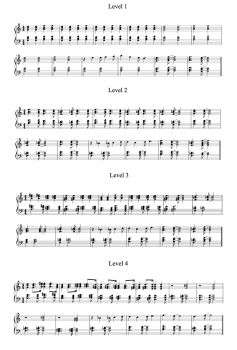April 23, 2014 report
Study shows women's menstrual cycle phase impacts sexual preference for composers of more complex music

(Medical Xpress)—An intriguing study conducted by Benjamin Charlton, of the University of Sussex, has resulted in findings that suggest women prefer male composers that produce complex pieces of music when at the most fertile point in their menstrual cycle. In his paper published in Proceedings of the Royal Society B: Biological Sciences, Charlton describes his study that involved subjecting volunteer women to snippets of music and querying them regarding their desire to have a short or long term (sexual) relationship with the composer, based solely on the music they'd created.
People like music, of that there is no doubt. Some like to create it, others to play and many others to listen to others perform. Why this is has baffled scientists for generations—it apparently has no real purpose, from a scientific standpoint. Some, such as Charles Darwin, have insisted that it's all a mating ritual, though to date, no one has been able to prove it. In his study, Charlton appears to come close.
In his experiment, Charlton enlisted the assistance of 1,465 healthy young women (average age 27.9) none of whom were pregnant, on the pill or nursing. Each was asked to participate in one of two experiments. In the first, some of the women were asked to listen to different pieces of recorded piano music and then to report how complex the composition was. Next, a different group of women was asked to listen to the same musical recordings and then to respond to questions regarding their degree of desire to have a relationship with the man that had written the piece—either short term, or long term.
Afterwards, in analyzing the data provided by the answers the women had given, Charlton discovered a trend—the women at the peak of fertility held a preference for a short term relationship with the unknown composer. No other trends were apparent. Charlton claims his finding suggest that women in general find composers who write more complex music, to be more open to a short term relationship, when they are at the peak of fertility, which presumably would suggest a desire to produce offspring with them. And that, he contends, suggests that the point of music is to entice a mate.

Charlton plans to continue his research by testing the impact of music complexity on men listening to music written by female composers to determine if they find complex pieces more seductive as well.
More information: "Menstrual cycle phase alters women's sexual preferences for composers of more complex music." Proc. R. Soc. B June 7, 2014 281 1784 20140403; DOI: 10.1098/rspb.2014.0403 1471-2954
Abstract
Over 140 years ago Charles Darwin first argued that birdsong and human music, having no clear survival benefit, were obvious candidates for sexual selection. Whereas the first contention is now universally accepted, his theory that music is a product of sexual selection through mate choice has largely been neglected. Here, I provide the first, to my knowledge, empirical support for the sexual selection hypothesis of music evolution by showing that women have sexual preferences during peak conception times for men that are able to create more complex music. Two-alternative forced-choice experiments revealed that woman only preferred composers of more complex music as short-term sexual partners when conception risk was highest. No preferences were displayed when women chose which composer they would prefer as a long-term partner in a committed relationship, and control experiments failed to reveal an effect of conception risk on women's preferences for visual artists. These results suggest that women may acquire genetic benefits for offspring by selecting musicians able to create more complex music as sexual partners, and provide compelling support for Darwin's assertion 'that musical notes and rhythm were first acquired by the male or female progenitors of mankind for the sake of charming the opposite sex'.
© 2014 Medical Xpress

















